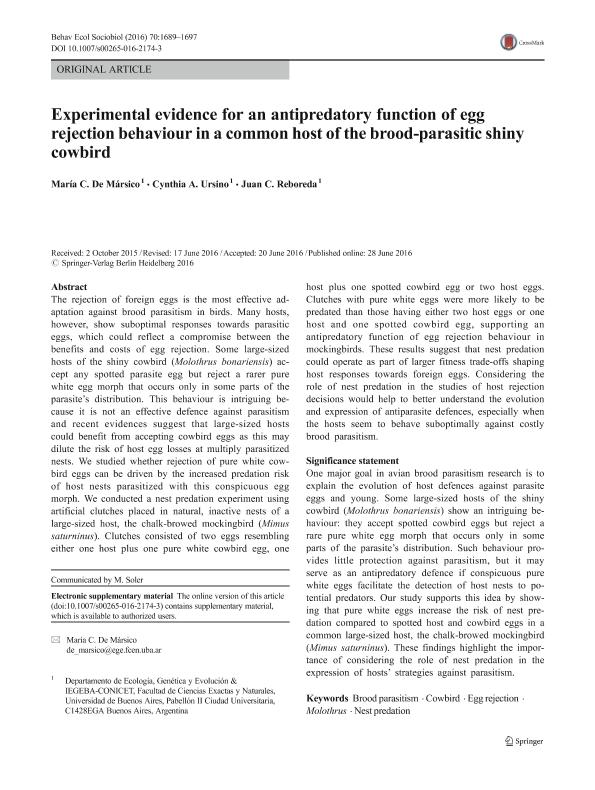Artículo
Experimental evidence for an antipredatory function of egg rejection behaviour in a common host of the brood-parasitic shiny cowbird
Fecha de publicación:
10/2016
Editorial:
Springer
Revista:
Behavioral Ecology And Sociobiology
ISSN:
0340-5443
e-ISSN:
1432-0762
Idioma:
Inglés
Tipo de recurso:
Artículo publicado
Clasificación temática:
Resumen
Abstract: The rejection of foreign eggs is the most effective adaptation against brood parasitism in birds. Many hosts, however, show suboptimal responses towards parasitic eggs, which could reflect a compromise between the benefits and costs of egg rejection. Some large-sized hosts of the shiny cowbird (Molothrus bonariensis) accept any spotted parasite egg but reject a rarer pure white egg morph that occurs only in some parts of the parasite’s distribution. This behaviour is intriguing because it is not an effective defence against parasitism and recent evidences suggest that large-sized hosts could benefit from accepting cowbird eggs as this may dilute the risk of host egg losses at multiply parasitized nests. We studied whether rejection of pure white cowbird eggs can be driven by the increased predation risk of host nests parasitized with this conspicuous egg morph. We conducted a nest predation experiment using artificial clutches placed in natural, inactive nests of a large-sized host, the chalk-browed mockingbird (Mimus saturninus). Clutches consisted of two eggs resembling either one host plus one pure white cowbird egg, one host plus one spotted cowbird egg or two host eggs. Clutches with pure white eggs were more likely to be predated than those having either two host eggs or one host and one spotted cowbird egg, supporting an antipredatory function of egg rejection behaviour in mockingbirds. These results suggest that nest predation could operate as part of larger fitness trade-offs shaping host responses towards foreign eggs. Considering the role of nest predation in the studies of host rejection decisions would help to better understand the evolution and expression of antiparasite defences, especially when the hosts seem to behave suboptimally against costly brood parasitism. Significance statement: One major goal in avian brood parasitism research is to explain the evolution of host defences against parasite eggs and young. Some large-sized hosts of the shiny cowbird (Molothrus bonariensis) show an intriguing behaviour: they accept spotted cowbird eggs but reject a rare pure white egg morph that occurs only in some parts of the parasite’s distribution. Such behaviour provides little protection against parasitism, but it may serve as an antipredatory defence if conspicuous pure white eggs facilitate the detection of host nests to potential predators. Our study supports this idea by showing that pure white eggs increase the risk of nest predation compared to spotted host and cowbird eggs in a common large-sized host, the chalk-browed mockingbird (Mimus saturninus). These findings highlight the importance of considering the role of nest predation in the expression of hosts’ strategies against parasitism.
Palabras clave:
Brood Parasitism
,
Cowbird
,
Egg Rejection
,
Molothrus
,
Nest Predation
Archivos asociados
Licencia
Identificadores
Colecciones
Articulos(IEGEBA)
Articulos de INSTITUTO DE ECOLOGIA, GENETICA Y EVOLUCION DE BS. AS
Articulos de INSTITUTO DE ECOLOGIA, GENETICA Y EVOLUCION DE BS. AS
Citación
de Marsico, Maria Cecilia; Ursino, Cynthia Alejandra; Reboreda, Juan Carlos; Experimental evidence for an antipredatory function of egg rejection behaviour in a common host of the brood-parasitic shiny cowbird; Springer; Behavioral Ecology And Sociobiology; 70; 10; 10-2016; 1689-1697
Compartir
Altmétricas




